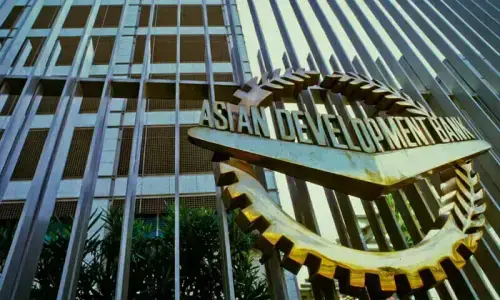Nearly a month after the Supreme Court directed the parliament to legislate on the extension/appointment of an army chief, the federal government on Thursday submitted a review petition against the top court's verdict and asked that it be set aside.
"The review petition was filed [in the Supreme Court] because our legal team thoroughly, comprehensively, and closely reviewed all aspects of the decision and concluded that there are several legal gaps in the verdict," prime minister's aide Firdous Ashiq Awan said while talking to the media.
The review appeal, a copy of which is available with Dawn.com, lists the federal government, Prime Minister Imran Khan, President Arif Alvi and Army Chief Gen Qamar Javed Bajwa as petitioners.
"[There are] flaws in the verdict, and legal and constitutional faults surfaced in the decision. With due respect to the judiciary, the government wants rectification of the faults and has thus decided to file the review petition. The review petition is being filed ultimately in the higher public interest," she added.
Prime Minister Imran Khan in August had granted a three-year extension to Gen Qamar Javed Bajwa, who was supposed to retire on November 29. The top court, led by the then chief justice of Pakistan Asif Saeed Khosa, however, had suspended the notification on November 26 due to irregularities in the manner of extension.
After three days of heightened uncertainty, the three-member Supreme Court bench on Nov 28 had directed the parliament to legislate on the extension/reappointment of an army chief within six months, during which Bajwa would stay on.
Read: Ball in parliament's court to provide certainty to army chief's post with new law: SC
"We would like to emphasise that this crucial matter of the tenure of COAS and its extension, which has a somewhat chequered history, is before the Parliament, to fix for all times to come," wrote Justice Syed Mansoor Ali Shah, a member of the three-judge bench which heard the case, in the court's 43-page judgment.
"It is now for the people of Pakistan and their chosen representatives in the Parliament to come up with a law that will provide certainty and predictability to the post of COAS, remembering that in strengthening institutions, nations prosper," the court had noted.
Speaking on Thursday, Awan said the option of legislation through the parliament, after filing the review petition, will remain intact, adding that Law Minister Farogh Naseem will brief the media in detail about this.
'Verdict overlooks laws in Constitution'
The petition, submitted by Attorney General Anwar Mansoor, questions the legal aspects of the judgement.
It is pertinent to mention that Mansoor, prior to the short order being announced in November, had given an undertaking in a categorical manner that the earlier practice of granting extensions to the army chief would be codified under the law by pushing legislation through parliament.
"The Impugned Judgment is bad in law and facts. The same is completely without jurisdiction, void ab initio and of no legal effect," reads the petition submitted against the verdict.
It further says that the order "suffers from material irregularities" which have "converted the process from being one in aid of justice to a process of injustice".
It also claims that the court has "completely overlooked" the laws laid out in the Constitution as well as "vital laws".
Furthermore, it has been insisted that the petition has been filed "in the interest of public good".
The petition says that the "court should not have interfered on the grounds of public policy and collective conscience".
"It is respectfully pointed out that glaring omissions and patent mistakes have crept into the Impugned Judgment, violating the law and the Constitution.
"The nature of the controversy at hand was really the rarest of the rarest cases in which Honourable Court should not have interfered on the grounds of public policy and collective conscience. In fact, the Honourable Court had no role to upset the age-long accepted conventions and the considered policy of the government," says the petition.
The petition notes that the court said that chosen representatives should decide matters pertaining to appointment and extension of the army chief and that people can "accept or reject" the decision taken through their chosen representatives.
"[...] With due respect this means that the appointment has to be made through the chosen representatives, who have left the matter to be dealt by conventions by not legislating for 7 decades and there is nothing wrong with this."
The petitioner "with the highest respect" insisted that the judgement by the top court is "patently erroneous" and that the errors are "floating on the face of the record".
The appeal says that the Supreme Court had "fundamentally failed to note" that the terms and conditions, service rights and tenure of a sitting official "can be regulated by departmental instructions, office memoranda, conventions, customs, usages and other executive instructions, provided they are not in violation of any statutory provisions".
"In the present case, the appointment of the COAS was strictly in accordance with the settled departmental practice followed for seven decades or so."
The attorney general, while arguing before the top court in November, had contended that the laws and rules governing the service issue of the army chief were “silent on the tenure” because if they were strictly followed, the entire armed forces would be left headless.
"Rigidity breaks the stick but flexibility keeps it intact," the AG had said.
Cliffhanger verdict
In what came as a breather for the federal government after three days of heightened uncertainty, the Supreme Court on Nov 28 had allowed extension/reappointment of Gen Bajwa for another six months.
While doing so, the apex court had shifted the onus to parliament and asked the government to determine the tenure, terms and conditions of service of the army chief through legislation within the same period i.e. six months.
The Supreme Court had also exercised restraint in view of the consideration that the COAS is responsible for the command, discipline, training, administration, organisation and preparedness for war of the army and is chief executive at the General Headquarters.
“Therefore, we find it appropriate to leave the matter to parliament and the federal government to clearly specify the terms and conditions of service of the COAS through an Act of Parliament and to clarify the scope of Article 243 of the Constitution under which the government appointed Gen Bajwa. Thus the current appointment of Gen Bajwa as COAS will be subject to the legislation and will continue for a period of six months from Thursday. After this the new legislation will determine his tenure and other terms and conditions of service,” the short order had said.
“The attorney general has taken pains to explain that the answers to these questions are based on practice being followed in the Pakistan Army, but this practice has not been codified under the law,” the order said.
“Article 243 clearly mandates that the federal government will have the control and command of the armed forces and the supreme command of the armed forces will vest in the president who will have the power to raise and maintain the military, and on whose advice the prime minister will appoint the army chief. But the laws — the Pakistan Army Act, 1952, the Pakistan Army Act Rules, 1954 and the Army Regulations (Rules), 1998 do not specify the tenure, retirement, reappointment and extension of the army chief or of the general of the Pakistan Army,” the order had noted.
































